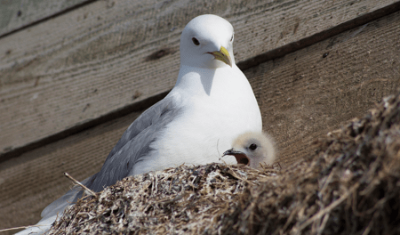Lovebirds or loathebirds? Personality and divorce in an Arctic seabird
My name is Fionnuala McCully and I am originally from Northern Ireland. I moved to Liverpool in 2019 start my PhD. I am a behavioural ecologist - so I’m interested in how animal behaviour evolves over time. My specialism is Ornithology, which is the scientific study of the fascinating world of birds. Throughout my career, I have focused on a variety of avian species, including corvids (such as crows), flamingos, and various seabirds.
My research
I am particularly interested in parental care of seabirds and how individual differences in behaviour and personality impact how they rear their young, especially how parents work together to achieve a shared goal.
Photo of kittiwake and chick by Stephanie Harris
 I have been focussing on observing key behaviours in two different species, the wandering albatross and the black-legged kittiwake and analysing certain traits such as foraging trip length, coordination of care and divorce. Analysing this behaviour can tell us a lot about how each species treats their young differently and how individuals employ various strategies to cooperate during parenthood.
I have been focussing on observing key behaviours in two different species, the wandering albatross and the black-legged kittiwake and analysing certain traits such as foraging trip length, coordination of care and divorce. Analysing this behaviour can tell us a lot about how each species treats their young differently and how individuals employ various strategies to cooperate during parenthood.
To gather data for my study, I travelled to the Arctic to work in Pyramiden, an abandoned soviet mining town in Svalbard. The Black-Legged Kittiwakes nest on the deserted buildings, making it the perfect place to collect data during their breeding season. It was such an incredible opportunity to work with such charismatic animals in such a unique location.
What are your next steps?
Finish my thesis! That is my entire life between now and the Autumn. Next year, I will be taking up a post as a University Teacher in University of Liverpool's School of Environmental Science. I wasn’t ready to leave Liverpool just yet and I’m thrilled I’ll be able to continue contributing to the department and my research group for another 12 months.
After that, I will definitely look for another job in science communication. I have had a little bit of experience in working in the media which I have enjoyed, so I may try to go down that ‘glamourous’ route.
 My 3-minute thesis
My 3-minute thesis
I’m really grateful that the 3-minute thesis has given me a platform to connect with a different audience and spread the message that the world’s seabirds are in deep trouble. Human activity, such as overfishing, has driven widespread decline in lots of species including both of those featured in my thesis.
My work demonstrates than we have more in common with these birds than we thought. Their relationships share multiple similarities with our own. Communicating my findings to the public can help people identify with these birds, which might encourage greater collective conservation efforts.
The 3MT has taught me that even during a project as intense as your PhD you can still make time for extra activities that you really enjoy. During a PhD, you spend a lot of time on data management and analysis. Although I have these skills, I am much more interested in science communication, but PhD students often have to actively seek out opportunities to showcase their work. 3MT provides a perfect opportunity to do this and allows you to get away from the computer (and your data!) for a while!
I was delighted to be announced as the winner of the University of Liverpool 3MT competition and I am really proud to represent the University at the UK quarter finals competition to be hosted by Vitae in June.